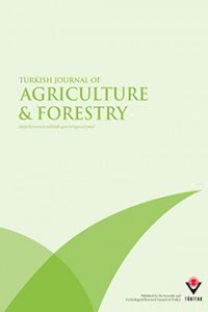Genotypic variability for tuber yield, biomass, and drought tolerance in Jerusalem artichoke germplasm
Drought, bioethanol, inulin
Genotypic variability for tuber yield, biomass, and drought tolerance in Jerusalem artichoke germplasm
Drought, bioethanol, inulin,
___
- Azhar A, Hamdy MK (2003). Alcohol fermentation of sweet potato. I. Acid hydrolysis and factors involved. Biotechnol Bioeng 23: 79–886.
- Conde JR, Tenorio JL, Rodriguez-Maribona B, Ayerbe L (1991). Tuber yield of Jerusalem artichoke (Helianthus tuberosus L.) in relation to water stress. Biomass Bioenerg 1: 137–142.
- Denoroy P (1996). The crop physiology of Helianthus tuberosus L.: A model oriented view. Biomass Bioenerg 11: 11–32.
- Doorenbos J, Pruitt WO (1992). Calculation of crop water requirement. In: Crop Water Requirement. Rome, Italy: FAO of the United Nations, pp. 1–65.
- Gomez KA, Gomez AA (1984). Statistical Procedures for Agricultural Research. New York, NY, USA: John Wiley and Sons.
- Hank RJ, Keller J, Rasmussen VP, Wilson GD (1976). Line source sprinkler for continuous variable-crop production studies. Soil Sci Soc Am J 40: 426–429.
- Kays SJ, Nottingham SF (2007). Biology and Chemistry of Jerusalem Artichoke: Helianthus tuberosus L. Boca Raton, FL, USA: CRC Press.
- Kramer PJ (1980). Drought, stress and the origin of adaptation. In: Turner NC, Kramer PJ, editors. Adaptation of Plants to Water and High Temperature Stress. New York, NY, USA: John Wiley and Sons, pp. 7–20.
- Kim S, Park JM,Kim CH (2013). Ethanol production using whole plant biomass of Jerusalem artichoke by Kluyveromyces marxianus CBS1555. Appl Biochem Biotechnol 169: 1531–1545.
- Li L, Li L, Wang Y, Du Y, Qin S (2013). Biorefinery products from the inulin-containing crop Jerusalem artichoke. Biotechnol Lett 35: 471–477.
- Lin Y, Tanaka S (2006). Ethanol fermentation from biomass resources: current state and prospects. Appl Microbiol Biotechnol 69: 627–642.
- Liu ZX, Spiertz JHJ, Jing S, Shuai X, Guang HX (2012). Growth and yield performance of Jerusalem artichoke clones in a semiarid region of China. Agron J 104: 1538–1546.
- Losavio N, Lamascese N, Vonella AV (1997). Water requirements and nitrogen fertilization in Jerusalem artichoke (Helianthus tuberosus L.) grown under Mediterranean conditions. Acta Hortic 449: 205–209.
- Margaritis A, Pratima B (1983). Effect of sugar concentration in Jerusalem artichoke extract on Kluyveromyces marxianus growth and ethanol production. Appl Environ Microbiol 45: 723–725.
- Monti A, Amaducci MT, Venturi G (2005). Growth response, leaf gas exchange and fructans accumulation of Jerusalem artichoke (Helianthus tuberosus L.) as affected by different water regimes. Eur J Agron 23: 136–145.
- Pimsean W, Jogloy S, Suriharn B, Kesmala T, Pensuk V, Patanothai A (2010). Genotype by environment (GxE) interactions for yield components of Jerusalem artichoke (Helianthus tuberosus L.). Asian J Plant Sci 9: 11–19.
- Robinson RG (1978). Production and culture. In: Carter JF, editor. Sunflower Science and Technology. Agronomy 19. Madison, WI, USA: The American Society of Agronomy, Crop Science Society of America, and Soil Science Society of America, pp. 89–143.
- Rodrigues MA, Sousa L, Cabanas JE, Arrobas M (2007). Tuber yield and leaf mineral composition of Jerusalem artichoke (Helianthus tuberosus L.) grown under different cropping practices. Span J Agric Res 5: 545–553.
- Ruttanaprasert R, Jogloy S, Vorasoot N, Kesmala T, Kanwar RS, Holbrook CC, Patanothai A (2013). Photoperiod and growing degree days effect on dry matter partitioning in Jerusalem artichoke. Int J Plant Prod 7: 393–416.
- Schittenhelm S (1999). Agronomic performance of root chicory, Jerusalem artichoke and sugarbeet in stress and non-stress environment. Crop Science 39: 1815–1823.
- Stephen AM, Phillips GO, Willians PA (2006). Food Polysaccharides and Their Applications. Boca Raton, FL, USA: CRC Press. Szambelan K, Nowak J, Jelen H (2005). The composition of Jerusalem artichoke (Helianthus tuberosus L.) spirits obtained from fermentation with bacteria and yeasts. Eng Life Sci 5: 68–71.
- Walker GM (2010). Bioethanol: Science and Technology of Fuel Alcohol. London, UK: Ventus Publishing
- ISSN: 1300-011X
- Yayın Aralığı: Yılda 6 Sayı
- Yayıncı: TÜBİTAK
Macronutrient concentration and remobilization in spring wheat organs during grain filling
Murat TİRYAKİOĞLU, Mehmet YILDIRIM, Sema KARANLIK
Hoang Thai DINH, Wanwipa KAEWPRADIT, Sanun JOGLOY, Nimitr VORASOOT, Aran PATANOTHAI
Genetic variation for growth and yield parameters in half-sib progenies of Melia azedarach (Linn.)
Himanshu MEENA, Ashok KUMAR, Rajni SHARMA, Sanjeev Kumar CHAUHAN, Krishana Mohan BHARGAVA
Macronutrient concentration and remobilization in spring wheat organs during grain flling
Mehmet YILDIRIM, Murat TİRYAKİOĞLU, Sema KARANLIK
Behiye Banu BİLGEN, Nuray KAYA
Hoang Tai DINH, Wanwipa KAEWPRADIT, Sanun JOGLOY, Nimitr VORASOOT, Aran PATANOTHAI
Gureveen ARORA, Sumit CHATURVEDI, Rajesh KAUSHAL, Ajeet NAIN, Salil TEWARI
